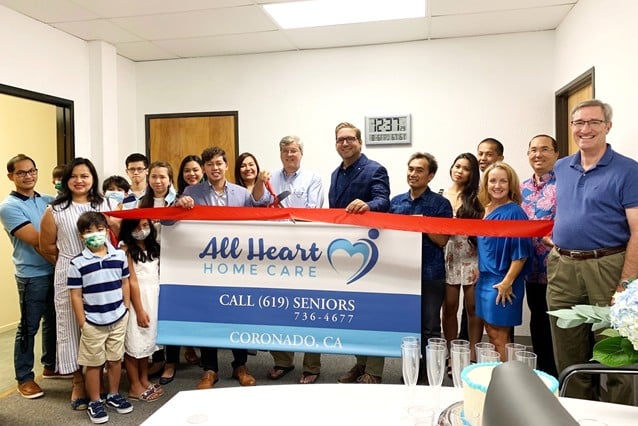
Simple Dietary Changes to Help Seniors Stay Healthy
June 21, 2021
All Heart Home Care Celebrates Grand Opening in Coronado!
August 6, 2021This article will discuss an important topic on caregiver tips for seniors living with Alzheimer’s. Alzheimer’s disease is a devastating neurological condition that affects more than 5.1 million Americans. People with Alzheimer’s suffer from a gradual loss of cognitive function, with memory loss and confusion being the primary symptoms of the disease. It is a very difficult disease to deal with, for both the patient and their caregiver.
This article will share some useful tips for caregivers who are looking after seniors with Alzheimer’s disease. These tips will help you improve health outcomes for your patient and enhance their quality of life.
Caring for someone with Alzheimer’s disease
Helping someone with Alzheimer’s disease can be very difficult. The patient can experience some severe neurological symptoms including hallucinations, delusions, and paranoia. Their personality may change, and Alzheimer’s patients can sometimes become aggressive. Eventually, people with Alzheimer’s struggle to communicate and cannot perform the simplest of tasks without assistance.
If the caregiver has a personal relationship with the patient, it can be emotionally draining to watch their personality change and to see them withdraw from the world. Some of the tips below can help the patient remain active and engaged for as long as possible.
Improve the way you communicate with the patient
Alzheimer’s patients gradually lose the ability to follow conversations, remember specific words and express themselves coherently. This makes it very difficult for them to communicate their wishes to their caregiver. They can also struggle to respond to communication from the caregiver and find it difficult to answer certain types of questions.
Here are a few simple approaches to make communicating easier:
- Specifically refer to important objects
Use “Here is your spoon” or “Here is your coffee” instead of “here it is” or other vague phrases. - Don’t ask open-ended questions that always require a response
Instead of asking “Do you need to use the bathroom?” use “the Bathroom is here” - Avoid confusing expressions and slang
The patient may struggle to understand “Let’s hop to it” or “Let’s wrap it up” - Avoid using negatives
Avoid use words like “Never” or “Don’t” because they make sentences harder to understand. - Use gestures as well as words
Point to the objects that you are referring to
Avoid quizzing them
While it is important to keep the patient mentally active and engaged with the world around them, asking them a lot of questions does not always help their mental state. Questions like “Do you remember my name?” or “What did we have for dinner last night?” can become frustrating and irritating.
Try to understand their reality and accept it
Alzheimer’s sufferers can temporarily forget important events that have happened in their lives. One day they might forget that their spouse or a parent has passed away. If they are talking about a loved one as if they are still alive, don’t feel the need to correct them. Telling them that their mother is no longer alive could be very traumatic and upsetting. There is no point in correcting them.
Plan meaningful activities that the patient enjoys
Planning different activities for each day can keep the Alzheimer’s sufferer engaged while also lower stress levels for the caregiver. For example, taking a walk, doing some gardening, listening to music, and preparing a meal are all activities that can be enjoyed by both the patient and the caregiver.
Provide the patient with nutritious food they enjoy
Proper nutrition helps the patient remain strong and healthy. Unfortunately, eating well becomes difficult for people with dementia. Alzheimer’s patients often suffer from a loss of appetite, forget they are hungry, think they have already eaten or become overwhelmed by the different food choices available. Some simple tips for helping an Alzheimer’s patient eat include:
- Serve meals in a quiet space without distractions
- If the patient is struggling to use cutlery, serve foods that can be eaten with their hands.
- Split meals into components to avoid confusing the patient
- Keep the table simple to avoid confusion
- People with Alzheimer’s prefer foods that are soft and sweet. Look for foods that fulfill this criteria while still being nutritious. For example, bananas, smoothies and mashed vegetables.
Minimize distractions
Alzheimer’s patients benefit from having a calm and relaxing environment without too many distractions. Avoid having a radio or television turned on while you are communicating or enjoying an activity with the patient.
Don’t be disappointed if they don’t recognize you
Having a loved one not recognize your face is very difficult. Caregivers should be prepared for their patient to be confused about where they are and who they are with. When they don’t recognize you don’t be disappointed in front of them — just carry on and remain positive.
How All Heart Home Care Can Help
All Heart Home Care provides Caregivers to work in the client’s home. Our staff consists of talented and experienced Caregivers who know how to care for Alzheimer’s patients. They can help you in a number of ways, including:
- Meal preparation in the client’s home
- Cleaning and organizing the home
- Transportation to doctor’s appointments or social events
- Helping the client to perform exercises or physical rehabilitation
- Performing mental agility tasks with the client
- Helping the client with personal hygiene tasks and getting dressed
- Providing companionship for the client
If you are interested in learning more about caregiver tips for seniors living with Alzheimer’s and our services, contact All Heart Home Care today at 619-736-4677. We offer in-home consultations and would love to discuss the many home care services we provide!








